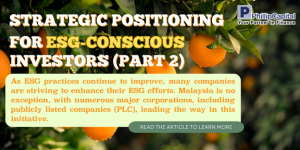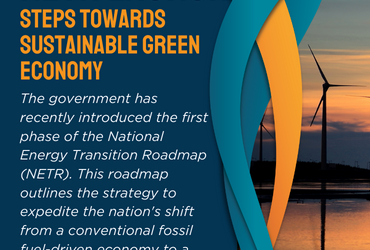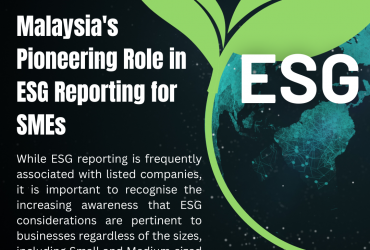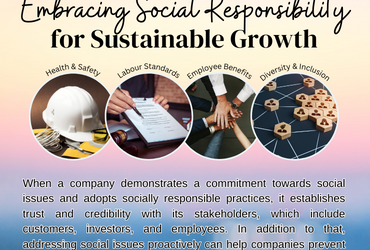
As ESG practices continue to improve, many companies are striving to enhance their ESG efforts. Malaysia is no exception, with numerous major corporations, including publicly listed companies (PLC), leading the way in this initiative.
This year, Bursa Malaysia Bhd has announced the inclusion of 12 new constituents to the FTSE4Good Bursa Malaysia (F4GBM) Index and 9 new constituents to the FTSE4Good Bursa Malaysia Shariah (F4GBMS) Index for the June 2024 review period. This brings the total number of constituents to 120 and 95, respectively (from 98 and 77 respectively a year ago). The F4GBM inclusions are namely, Bank Islam Malaysia, Carimin Petroleum, Harbour-Link Group, Icon Offshore, Pecca Group, Petron Malaysia Refining & Marketing, QL Resources, Shangri-La Hotels, Sports Toto, Sunway, Wasco and YTL Power International.
Meanwhile, Bank Islam Malaysia, Carimin Petroleum, Icon Offshore, Pecca Group, Petron Malaysia Refining & Marketing, QL Resources, Shangri-La Hotels, Sunway and Wasco are the new F4GBMS inclusions, while Eco World International is excluded from F4GBMS as it does not meet Shariah Advisory Council (SAC) criteria. Nevertheless, Eco World International is still a constituent in F4GBM.
We see this as a strong positive, as Malaysia’s PLCs are increasingly taking proactive measures to advance ESG initiatives, contributing to the country’s efforts in achieving its net-zero goals. Moreover, the increase in the total number of constituents to 120 for the F4GBM and 95 for the F4GBMS indices (up from 98 and 77, respectively, a year ago) represents a growth of approximately 22% and 23%, respectively, demonstrating substantial and commendable progress. Both indices are reviewed semi-annually in June and December against international benchmarks.
The table below outlines the sector allocations within both indices and highlights the most recent changes:

Source: Bursa Malaysia, compiled by PCM
Some observations:
- The Consumer and Energy sectors saw the greatest increase in inclusion in both the F4GBM and F4GBMS indices, both in absolute numbers and in relative weight within the indices. We commend these companies for enhancing their practices to meet the criteria for inclusion in ESG-focused indices. The Energy sector, in particular, has faced significant backlash in the past due to environmental and social risks. But now we see these companies are now better managing these risks, leading to inclusion into the indices, fostering greater stability and long-term viability.
- The Financial sector has seen its relative weightage in the F4GBM index decrease by 3%, as companies from other sectors (Consumer, Energy) are gaining prominence. This shift reflects a positive trend towards greater inclusion of companies from various sectors in the index. The potential addition of these sectors could enhance diversity and expand the range of ESG-conscious investment choices available to investors. The Financial sector still maintains 15 constituents in the F4GBM index. Similarly, the Property sector has also experienced a 2% decrease in its relative weightage in the F4GBMS index, but we view this as a minor concern. However, in absolute numbers, the sector still maintains 9 constituents in the F4GBMS index.
- In the June 2024 review, the top 5 sectors in the F4GBM Index remain Consumer (18%), Financial (13%), Technology (13%), Industrial (11%), and Energy (10%). In the F4GBMS Index, the leading sectors are Consumer (18%), Technology (17%), Industrial (12%), Energy (11%), and Property (9%). The F4GBMS Index sees lesser exposure to the Financial sector compared to F4GBM Index, primarily because most Financial stocks are non-Shariah compliant.
Looking ahead, we anticipate that ESG-conscious investors will likely continue to focus on the following sectors in Malaysia:
- Financial Services
The Financial Services sector (including Banks) in Malaysia plays a crucial role in promoting good governance practices and ethical behaviour. Transparent financial reporting, responsible lending, and ethical investment practices contribute to the governance and social aspects of ESG. Financial institutions also have the opportunity to support sustainable development through responsible financing and investment decisions.
- Technology
Many Tech names in Malaysia earn strong ESG ratings from investor research and ratings firms mainly due to their low-emissions footprint. In addition to that, Tech is strategically aligned with emerging ESG investment trends, including Electric Vehicles, Semiconductors, Artificial Intelligence, Biotechnology, and other related themes.
- Consumer Products & Services
Companies in the Consumer Products & Services sectors that prioritise sustainable sourcing, ethical production, and fair labour practices demonstrate a commitment to ESG principles. Efforts to reduce waste, promote recycling, and offer environmentally friendly products contribute to the environmental aspect of ESG.
- Industrial Products & Services
Certain industrial companies have exposures to the Technology/Semiconductor industries, which stand to gain from the rising trends mentioned earlier. Separately, some metal/chemical companies such as PMETAL and PCHEM are among the constituents of F4GBM and F4GBMS Index. PMETAL is seen as an indirect beneficiary of the global push towards decarbonisation as aluminium is the preferred metal of use in the EV and solar photovoltaic (PV) sectors. PCHEM has an established framework and internal policies in driving its ESG commitments. Sustainability KPIs were introduced in top management performance appraisals.
- Property
Numerous property projects are actively engaged in promoting sustainable development. This includes reducing carbon emissions by incorporating EV charging stations, water-efficient fittings to optimise water consumption, using sustainable/eco-friendly materials and more. Moreover, there are some publicly listed companies that specialise in affordable housing, aligning favourably with the social aspect of ESG principles.
- Energy
In the June 2024 review, four energy companies have been added to the F4GBM and F4GBMS Index: Carimin Petroleum, Icon Offshore, Petron Malaysia Refining & Marketing, and Wasco. These companies have adopted Sustainability Policies aligned with ESG goals, prioritizing efforts that contribute significantly to achieving the United Nations Sustainable Development Goals. We anticipate the inclusion of more ESG-focused companies in the Energy sector moving forward.
Not in the Top 6 list (yet) is the Utilities Sector. Despite comprising only 5 constituents in F4GBM and 3 constituents in F4GBMS, we believe that this sector holds considerable untapped potential. Malaysia’s push towards renewable energy, including solar, wind, and hydropower, showcases its commitment to reducing carbon emissions and mitigating climate change. Investing in renewable energy aligns with both environmental and social aspects of ESG, as it reduces reliance on fossil fuels and provides cleaner energy sources while creating job opportunities. A notable example is YTL Power International, the latest addition to F4GBM in the Utilities Sector. YTL Power has been dedicated to integrating ESG goals throughout its business operations and foundations. A recent demonstration of the company’s commitment to the green economy is the YTL Green Data Center Park, a 500MW data center in Kulai, Johor, noted as Malaysia’s pioneering data center campus to be co-powered by on-site solar energy.
While the leading ESG sectors in Malaysia aforementioned exemplify strong commitment to sustainable practices and governance, it is also crucial to recognize the potential of sectors like Utilities and Plantation, which, while not currently among the top ranked, offer significant opportunities for ESG-conscious investors. These sectors are increasingly focused on sustainability, regulatory compliance, and innovation, showcasing their dedication to ESG principles. As the investment landscape evolves, exploring these untapped potentials could yield both financial gains and positive ESG impacts. With the growing emphasis on ESG considerations, more companies are expected to enhance their ESG profiles, potentially leading greater inclusion in the index in the times ahead.
Identify investment opportunities – Phillip Managed Account for Retirement (PMART) and Phillip Managed Account (PMA) ESG
Phillip Capital Malaysia offers discretionary portfolio that invests in stocks with high ESG ratings from the F4GBM and F4GBMS Indices, namely PMART and PMA ESG. There are both conventional and Shariah options available. PMART and PMA ESG is suitable for investors who want to optimise the risk-adjusted return by constructing a diverse sustainable portfolio of ESG companies.
To explore the companies in which both Conventional and Shariah ESG mandates invest, you can refer to the provided link. We like these companies because they have received high ESG ratings, which we believe can contribute to their long-term sustainability, responsibility, and profitability.
Please click on the link to learn more or email us at cse.my@phillipcapital.com.my if you require any further information.
Disclaimer:
The information contained herein does not constitute an offer, invitation or solicitation to invest in Phillip Capital Management Sdn Bhd (“PCM”). This article has been reviewed and endorsed by the Executive Director (ED) of PCM. This article has not been reviewed by The Securities Commission Malaysia (SC). No part of this document may be circulated or reproduced without prior permission of PCM. This is not a collective investment scheme / unit trust fund. Any investment product or service offered by PCM is not obligations of, deposits in or guaranteed by PCM. Past performance is not necessarily indicative of future returns. Investments are subject to investment risks, including the possible loss of the principal amount invested. Investors should note that the value of the investment may rise as well as decline. If investors are in any doubt about any feature or nature of the investment, they should consult PCM to obtain further information including on the fees and charges involved before investing or seek other professional advice for their specific investment needs or financial situations. Whilst we have taken all reasonable care to ensure that the information contained in this publication is accurate, it does not guarantee the accuracy or completeness of this publication. Any information, opinion and views contained herein are subject to change without notice. We have not given any consideration to and have not made any investigation on your investment objectives, financial situation or your particular needs. Accordingly, no warranty whatsoever is given and no liability whatsoever is accepted for any loss arising whether directly or indirectly as a result of any persons acting on such information and advice.






